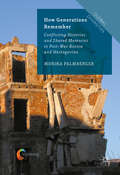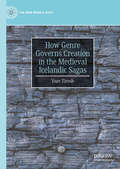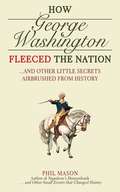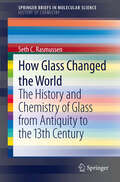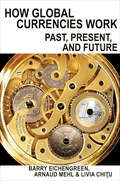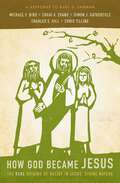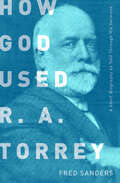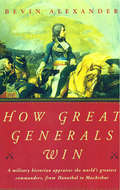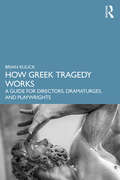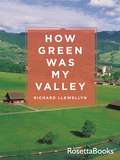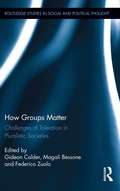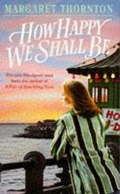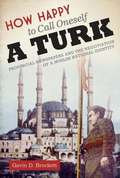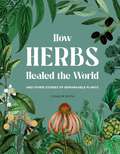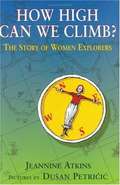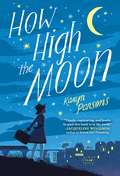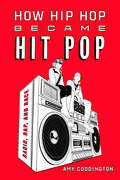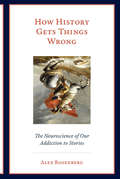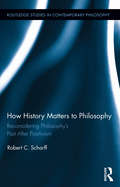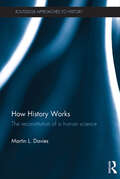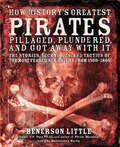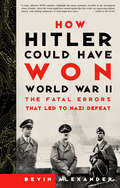- Table View
- List View
How Generations Remember
by Monika PalmbergerThis book provides a profound insight into post-war Mostar, and the memories of three generations of this Bosnian-Herzegovinian city. Drawing on several years of ethnographic fieldwork, it offers a vivid account of how personal and collective memories are utterly intertwined, and how memories across the generations are reimagined and 'rewritten' following great socio-political change. Focusing on both Bosniak-dominated East Mostar and Croat-dominated West Mostar, it demonstrates that, even in this ethno-nationally divided city with its two divergent national historiographies, generation-specific experiences are crucial in how people ascribe meaning to past events. It argues that the dramatic and often brutal transformations that Bosnia and Herzegovina has witnessed have led to alterations in memory politics, not to mention disparities in the life situations faced by the different generations in present-day post-war Mostar. This in turn has created variations in memories along generational lines, which affect how individuals narrate and position themselves in relation to the country's history. This detailed and engaging work will appeal to students and scholars of anthropology, sociology, political science, history and oral history, particularly those with an interest in memory, post-socialist Europe and conflict studies.
How Genre Governs Creation in the Medieval Icelandic Sagas (The New Middle Ages)
by Yoav TiroshThis book sets out to answer why genre matters when analysing sagas, medieval literature, and creation in general. How Genre Governs Creation in the Medieval Icelandic Sagas applies theoretical observations on the workings of genre to saga literature analysis, including media and film genre theory, as well as observations from reader-response theory. The text primarily focuses on Íslendingasögur, a group of prose or prosimetric texts that concern the medieval Norse world, usually taking place in the period between the end of the ninth and the mid-eleventh centuries and focusing on Iceland. Tirosh proposes new interpretations to several sagas, but more importantly provides a fresh perspective on the importance and application of genre theory to medieval literary studies.
How George Washington Fleeced the Nation: And Other Little Secrets Airbrushed From History
by Phil MasonOur view of the famous is one-dimensional--leading figures from history are summarized in history textbooks with one or two lines: Churchill the war-time genius, Gandhi the poor ascetic--but nobody is perfect and even the famous have their quirks and hidden secrets. How George Washington Fleeced the Nation reveals the often hilarious, sometimes shocking, and always highly informative foibles of the great and the good. Einstein, the most brilliant man who lived, regularly forgot his shoes and never learned to drive. Hitler possibly has a Jewish ancestor. Picasso avoided paying restaurant bills by doodling on their napkins instead. Prepared to be shocked, amused, and outraged at what they didn't teach you in high school.
How Glass Changed the World
by Seth C. RasmussenGlass production is thought to date to ~2500 BC and had found numerous uses by the height of the Roman Empire. Yet the modern view of glass-based chemical apparatus (beakers, flasks, stills, etc.) was quite limited due to a lack of glass durability under rapid temperature changes and chemical attack. This "brief" gives an overview of the history and chemistry of glass technology from its origins in antiquity to its dramatic expansion in the 13th century, concluding with its impact on society in general, particularly its effect on chemical practices.
How Global Currencies Work: Past, Present, and Future
by Barry Eichengreen Arnaud Mehl Livia ChituA powerful new understanding of global currency trends, including the rise of the Chinese yuanAt first glance, the modern history of the global economic system seems to support the long-held view that the leading world power’s currency—the British pound, the U.S. dollar, and perhaps someday the Chinese yuan—invariably dominates international trade and finance. In How Global Currencies Work, three noted economists provide a reassessment of this history and the theories behind the conventional wisdom.Offering a new history of global finance over the past two centuries, and marshaling extensive new data to test established theories of how global currencies work, Barry Eichengreen, Arnaud Mehl, and Livia Chiţu argue for a new view, in which several national monies can share international currency status, and their importance can change rapidly. They demonstrate how changes in technology and in the structure of international trade and finance have reshaped the landscape of international currencies so that several international financial standards can coexist. They show that multiple international and reserve currencies have in fact coexisted in the pastupending the traditional view of the British pound’s dominance prior to 1945 and the U.S. dollar’s dominance more recently.Looking forward, the book tackles the implications of this new framework for major questions facing the future of the international monetary system, from whether the euro and the Chinese yuan might address their respective challenges and perhaps rival the dollar, to how increased currency competition might affect global financial stability.
How God Became Jesus: The Real Origins of Belief in Jesus' Divine Nature---A Response to Bart Ehrman
by Simon Gathercole Craig A. Evans Michael F. Bird Charles E. Hill Chris TillingIn his recent book How Jesus Became God: The Exaltation of a Jewish Preacher From Galilee historian Bart Ehrman explores a claim that resides at the heart of the Christian faith— that Jesus of Nazareth was, and is, God. According to Ehrman, though, this is not what the earliest disciples believed, nor what Jesus claimed about himself. The first response book to this latest challenge to Christianity from Ehrman, How God Became Jesus features the work of five internationally recognized biblical scholars. While subjecting his claims to critical scrutiny, they offer a better, historically informed account of why the Galilean preacher from Nazareth came to be hailed as “the Lord Jesus Christ.” Namely, they contend, the exalted place of Jesus in belief and worship is clearly evident in the earliest Christian sources, shortly following his death, and was not simply the invention of the church centuries later.
How God Used R.A. Torrey: A Short Biography as Told Through His Sermons
by Fred SandersSermons to change you, a life to inspire you.Scholar, expositor, storyteller, and evangelist, R. A. Torrey was a master-of-all-trades minister. Crowds worldwide called his preaching &“that famous Torrey thing.&” And that famous Torrey thing won souls. Inside are the most famous, influential, and characteristic of his sermons. Though nearly a century old, they challenge us anew from Scripture and are greatly instructive to any who preach. Drawn from various periods of Torrey&’s ministry, and prefaced with bibliographic commentary, these sermons paint a portrait of a man gripped by God. But even more they grip the reader. They take us into the great halls where God&’s Word bellowed forth from Torrey and left his audiences hushed. It&’s no wonder that Torrey caught the attention of the great evangelist D. L. Moody. Be ready to be provoked. Like an archer who strikes with both accuracy and force, Torrey preached with clarity while cutting deep to the heart. Behind the bow you&’ll see a man fully sold on the kingdom of God, and you&’ll be inspired to follow suit.
How God Used R.A. Torrey: A Short Biography as Told Through His Sermons
by Fred SandersSermons to change you, a life to inspire you.Scholar, expositor, storyteller, and evangelist, R. A. Torrey was a master-of-all-trades minister. Crowds worldwide called his preaching &“that famous Torrey thing.&” And that famous Torrey thing won souls. Inside are the most famous, influential, and characteristic of his sermons. Though nearly a century old, they challenge us anew from Scripture and are greatly instructive to any who preach. Drawn from various periods of Torrey&’s ministry, and prefaced with bibliographic commentary, these sermons paint a portrait of a man gripped by God. But even more they grip the reader. They take us into the great halls where God&’s Word bellowed forth from Torrey and left his audiences hushed. It&’s no wonder that Torrey caught the attention of the great evangelist D. L. Moody. Be ready to be provoked. Like an archer who strikes with both accuracy and force, Torrey preached with clarity while cutting deep to the heart. Behind the bow you&’ll see a man fully sold on the kingdom of God, and you&’ll be inspired to follow suit.
How Great Generals Win
by Bevin Alexander"An astute military historian's appraisal of what separates the sheep from the wolves in the great game of war."--Kirkus Reviews If a key to military victory is to "get there first with the most," the true test of the great general is to decide where "there" is--the enemy's Achilles heel. Here is a narrative account of decisive engagements that succeeded by brilliant strategy more than by direct force. The reader accompanies those who fought, from Roman legionaries and Mongol horsemen to Napoleonic soldiery, American Civil War Rebels and Yankees, World War I Tommies, Lawrence of Arabia's bedouins, Chinese revolutionaries, British Desert Rats, Rommel's Afrika Korps, and Douglas MacArthur's Inchon invaders. However varied their weapons, the soldiers of all these eras followed a commander who faced the same obstacles and demonstrated the strategic and tactical genius essential for victory. "All warfare is based on deception," wrote Sun Tzu in The Art of War in 400 BCE. Bevin Alexander shows how great generals have interpreted this advice, and why it still holds true today.
How Greek Tragedy Works: A Guide for Directors, Dramaturges, and Playwrights
by Brian KulickHow Greek Tragedy Works is a journey through the hidden meanings and dual nature of Greek tragedy, drawing on its foremost dramatists to bring about a deeper understanding of how and why to engage with these enduring plays. Brian Kulick dispels the trepidation that many readers feel with regard to classical texts by equipping them with ways in which they can unpack the hidden meanings of these plays. He focuses on three of the key texts of Greek theatre: Aeschylus' Agamemnon, Euripides' The Bacchae, and Sophocles' Electra, and uses them to tease out the core principles of the theatre-making and storytelling impulses. By encouraging us to read between the lines like this, he also enables us to read these and other Greek tragedies as artists' manifestos, equipping us not only to understand tragedy itself, but also to interpret what the great playwrights had to say about the nature of plays and drama. This is an indispensable guide for anyone who finds themselves confronted with tackling the Greek classics, whether as a reader, scholar, student, or director.
How Green Was My Valley (Penguin Longman Active Reading Ser.)
by Richard LlewellynThe international-bestselling winner of the National Book Award and the basis for the Academy Award–winning film directed by John Ford. Huw Morgan remembers the days when his home valley was prosperous, verdant, and beautiful—before the mines came to town. The youngest son of a respectable mining family in South Wales, he is now the only one left in the valley, and his reminiscences tell the story of a family and a town both defined and ruined by the mines. Huw&’s story is both joyful and heartrending—a portrait of a place and a people existing now only in memory. Full of memorable characters, richly crafted language, and surprising humor, How Green Was My Valley is the first of four books chronicling Huw&’s life, including the sequels Up into the Singing Mountain, Down Where the Moon is Small, and Green, Green My Valley Now. &“The reader emerges from these tense pages strangely aglow with sharing the happiness of the characters . . . The simplicity of the language and its delicately strange flavor give the book added charm.&” —Chicago Tribune
How Groups Matter: Challenges of Toleration in Pluralistic Societies (Routledge Studies in Social and Political Thought #86)
by Gideon Calder Magali Bessone Federico ZuoloWhen groups feature in political philosophy, it is usually in one of three contexts: the redressing of past or current injustices suffered by ethnic or cultural minorities; the nature and scope of group rights; and questions around how institutions are supposed to treat a certain specific identity/cultural/ethnic group. What is missing from these debates is a comprehensive analysis of groups as both agents and objects of social policies. While this has been subject to much scrutiny by sociologists and social psychologists, it has received less attention from a normative and philosophical point of view. This volume asks: what problems are posed to political philosophy by a collection of individuals who act or are treated in a collective way? Focusing not only on ways in which institutions should treat groups, but also on the normative implications of considering groups as possible social agents, when acting either in vertical relations with the state or in horizontal relations with other groups (or individuals), this book explores these issues from both theoretical and practical perspectives. Contributors address both the nature of political and social philosophy itself, and the ways in which specific issues – affirmative action, race, religion and places of worship, the rights of states – have become political and social priorities.
How Happy We Shall Be: A gripping Blackpool saga that is hard to put down
by Margaret ThorntonTwo sisters search for love... In Margaret Thornton's How Happy We Shall Be, two sisters suffer heartache in the 1950s in a gripping saga that moves between the bustling streets of London and the windswept beaches of Blackpool. Perfect for fans of Annie Murray and Nadine Dorries. 'A smashing holiday read' - Lancashire Evening Telegraph Rosie and Patsy Bradshaw became sisters during the Second World War when Rosie was adopted as an orphaned evacuee in Blackpool. Since then, they've been the best of friends - some would say, inseparable - but as the girls reach adulthood it is time for them to part.Rosie is determined to make the most of life and travels to art college in London. She is enchanted by Kensington in the fifties and falls madly in love with her tutor. Despite knowing the dangers of such an attachment, Rosie is unprepared for just how much hurt lies ahead. Meanwhile, Patsy can't help feeling she doesn't fit in, and only a chance encounter with Ronnie Sykes, a childhood friend from Blackpool, gives new meaning and hope to her days at college. But a jealous rival soon puts paid to their romance...So it is that both sisters have yet to succeed in their search for love, and reunited in Blackpool, they decide to make a new start and recapture the happiness shared in their youth. What readers are saying about How Happy We Shall Be: 'I loved this book as I felt the characters were so real and I could sympathise with their conflicts''Margaret Thornton is a brilliant storyteller. Her books draw you in, so you feel you know the characters. Hard to put down' 'Five stars'
How Happy We Shall Be: A gripping Blackpool saga that is hard to put down
by Margaret ThorntonTwo sisters search for love... In Margaret Thornton's How Happy We Shall Be, two sisters suffer heartache in the 1950s in a gripping saga that moves between the bustling streets of London and the windswept beaches of Blackpool. Perfect for fans of Annie Murray and Nadine Dorries. 'A smashing holiday read' - Lancashire Evening TelegraphRosie and Patsy Bradshaw became sisters during the Second World War when Rosie was adopted as an orphaned evacuee in Blackpool. Since then, they've been the best of friends - some would say, inseparable - but as the girls reach adulthood it is time for them to part.Rosie is determined to make the most of life and travels to art college in London. She is enchanted by Kensington in the fifties and falls madly in love with her tutor. Despite knowing the dangers of such an attachment, Rosie is unprepared for just how much hurt lies ahead. Meanwhile, Patsy can't help feeling she doesn't fit in, and only a chance encounter with Ronnie Sykes, a childhood friend from Blackpool, gives new meaning and hope to her days at college. But a jealous rival soon puts paid to their romance...So it is that both sisters have yet to succeed in their search for love, and reunited in Blackpool, they decide to make a new start and recapture the happiness shared in their youth.What readers are saying about How Happy We Shall Be: 'I loved this book as I felt the characters were so real and I could sympathise with their conflicts''Margaret Thornton is a brilliant storyteller. Her books draw you in, so you feel you know the characters. Hard to put down' 'Five stars'
How Happy to Call Oneself a Turk
by Gavin D. BrockettThe modern nation-state of Turkey was established in 1923, but when and how did its citizens begin to identify themselves as Turks? Mustafa Kemal Ataturk, Turkey's founding president, is almost universally credited with creating a Turkish national identity through his revolutionary program to "secularize" the former heartland of the Ottoman Empire. Yet, despite Turkey's status as the lone secular state in the Muslim Middle East, religion remains a powerful force in Turkish society, and the country today is governed by a democratically elected political party with a distinctly religious (Islamist) orientation. In this history, Gavin D. Brockett takes a fresh look at the formation of Turkish national identity, focusing on the relationship between Islam and nationalism and the process through which a "religious national identity" emerged. Challenging the orthodoxy that Ataturk and the political elite imposed a sense of national identity from the top down, Brockett examines the social and political debates in provincial newspapers from around the country. He shows that the unprecedented expansion of print media in Turkey between 1945 and 1954, which followed the end of strict, single-party authoritarian government, created a forum in which ordinary people could inject popular religious identities into the new Turkish nationalism. Brockett makes a convincing case that it was this fruitful negotiation between secular nationalism and Islam--rather than the imposition of secularism alone--that created the modern Turkish national identity.
How Herbs Healed the World: And Other Stories of Remarkable Plants
by Connor Smith'The writing shines when recounting the stories behind these herbs, offering a blend of history and botanical fascination' - RHS, The GardenHerbs are wonderful things. Without them so much would not be possible. With the advance of science over the last two hundred years these once mystical plants have changed and saved countless lives, vastly improving our standard of living while providing us all with a much richer, healthier diet. Today, we take for granted a world full oflife-saving drugs, luxury cosmetics and exotic foods.This fascinating book will tell this story: revealing how poisons once used by the ancient Romans such as Deadly Nightshade are now being used in modern medicine or how the herbs used by indigenous people around the world have provided remedies for countless illnesses. It will explore the myths and legends behind herbs such as the infamous Mandrake and how herbs such as Yarrow are still being used to treat wounds today, just as they were thousands of years ago; and it will show how exotic herbs from across the globe have enriched our livesand delve into the origins of the culinary herbs that everyone knows and loves.Seventy-five herbs have been carefully chosen to tell the story of how they have each changed our world, looking back at their origins and what was once believed, while comparing this with the modern day uses and the scientific value of these plants enabling the reader to understand and appreciate their importance.Each double page spread will provide both historic and modern illustrations of each herb alongside captivating accounts of their historical and modern day uses including supplementary botanical and horticultural information for each.
How Herbs Healed the World: And Other Stories of Remarkable Plants
by Connor Smith'The writing shines when recounting the stories behind these herbs, offering a blend of history and botanical fascination' - RHS, The GardenHerbs are wonderful things. Without them so much would not be possible. With the advance of science over the last two hundred years these once mystical plants have changed and saved countless lives, vastly improving our standard of living while providing us all with a much richer, healthier diet. Today, we take for granted a world full oflife-saving drugs, luxury cosmetics and exotic foods.This fascinating book will tell this story: revealing how poisons once used by the ancient Romans such as Deadly Nightshade are now being used in modern medicine or how the herbs used by indigenous people around the world have provided remedies for countless illnesses. It will explore the myths and legends behind herbs such as the infamous Mandrake and how herbs such as Yarrow are still being used to treat wounds today, just as they were thousands of years ago; and it will show how exotic herbs from across the globe have enriched our livesand delve into the origins of the culinary herbs that everyone knows and loves.Seventy-five herbs have been carefully chosen to tell the story of how they have each changed our world, looking back at their origins and what was once believed, while comparing this with the modern day uses and the scientific value of these plants enabling the reader to understand and appreciate their importance.Each double page spread will provide both historic and modern illustrations of each herb alongside captivating accounts of their historical and modern day uses including supplementary botanical and horticultural information for each.
How High Can We Climb? The Story of Women Explorers
by Jeannine AtkinsProfiles twelve women explorers of the land and sea: Jeanne Baret, Florence Baker, Annie Smith Peck, Josephine Peary, Arnarulunguaq, Elisabeth Casteret, Nicole Maxwell, Sylvia Earle, Junko Tabei, Kay Cottee, Sue Hendrickson, and Ann Bancroft.
How High the Moon
by Karyn ParsonsTo Kill a Mockingbird meets One Crazy Summer in this powerful, bittersweet debut about one girl's journey to reconnect with her mother and learn the truth about her father in the tumultuous times of the Jim Crow South. <P><P> Dreaming In the small town of Alcolu, South Carolina, in 1944, 12-year-old Ella spends her days fishing and running around with her best friend Henry and cousin Myrna. But life is not always so sunny for Ella, who gets bullied for her light skin tone, and whose mother is away pursuing a jazz singer dream in Boston. So Ella is ecstatic when her mother invites her to visit for Christmas. Little does she expect the truths she will discover about her mother, the father she never knew and her family's most unlikely history. And after a life-changing month, she returns South and is shocked by the news that her schoolmate George has been arrested for the murder of two local white girls. <P><P> Bittersweet and eye-opening, How High the Moon is a timeless novel about a girl finding herself in a world all but determined to hold her down.
How Hip Hop Became Hit Pop: Radio, Rap, and Race
by Amy CoddingtonA free ebook version of this title is available through Luminos, University of California Press's Open Access publishing program. Visit www.luminosoa.org to learn more.How Hip Hop Became Hit Pop examines the programming practices at commercial radio stations in the 1980s and early 1990s to uncover how the radio industry facilitated hip hop's introduction into the musical mainstream. Constructed primarily by the Top 40 radio format, the musical mainstream featured mostly white artists for mostly white audiences. With the introduction of hip hop to these programs, the radio industry was fundamentally altered, as stations struggled to incorporate the genre's diverse audience. At the same time, as artists negotiated expanding audiences and industry pressure to make songs fit within the confines of radio formats, the sound of hip hop changed. Drawing from archival research, Amy Coddington shows how the racial structuring of the radio industry influenced the way hip hop was sold to the American public, and how the genre's growing popularity transformed ideas about who constitutes the mainstream.
How History Gets Things Wrong: The Neuroscience of Our Addiction to Stories (The\mit Press Ser.)
by Alex RosenbergWhy we learn the wrong things from narrative history, and how our love for stories is hard-wired.To understand something, you need to know its history. Right? Wrong, says Alex Rosenberg in How History Gets Things Wrong. Feeling especially well-informed after reading a book of popular history on the best-seller list? Don't. Narrative history is always, always wrong. It's not just incomplete or inaccurate but deeply wrong, as wrong as Ptolemaic astronomy. We no longer believe that the earth is the center of the universe. Why do we still believe in historical narrative? Our attachment to history as a vehicle for understanding has a long Darwinian pedigree and a genetic basis. Our love of stories is hard-wired. Neuroscience reveals that human evolution shaped a tool useful for survival into a defective theory of human nature. Stories historians tell, Rosenberg continues, are not only wrong but harmful. Israel and Palestine, for example, have dueling narratives of dispossession that prevent one side from compromising with the other. Henry Kissinger applied lessons drawn from the Congress of Vienna to American foreign policy with disastrous results. Human evolution improved primate mind reading—the ability to anticipate the behavior of others, whether predators, prey, or cooperators—to get us to the top of the African food chain. Now, however, this hard-wired capacity makes us think we can understand history—what the Kaiser was thinking in 1914, why Hitler declared war on the United States—by uncovering the narratives of what happened and why. In fact, Rosenberg argues, we will only understand history if we don't make it into a story.
How History Matters to Philosophy: Reconsidering Philosophy’s Past After Positivism (Routledge Studies in Contemporary Philosophy)
by Robert C. ScharffIn recent decades, widespread rejection of positivism’s notorious hostility toward the philosophical tradition has led to renewed debate about the real relationship of philosophy to its history. How History Matters to Philosophy takes a fresh look at this debate. Current discussion usually starts with the question of whether philosophy’s past should matter, but Scharff argues that the very existence of the debate itself demonstrates that it already does matter. After an introductory review of the recent literature, he develops his case in two parts. In Part One, he shows how history actually matters for even Plato’s Socrates, Descartes, and Comte, in spite of their apparent promotion of conspicuously ahistorical Platonic, Cartesian, and Positivistic ideals. In Part Two, Scharff argues that the real issue is not whether history matters; rather it is that we already have a history, a very distinctive and unavoidable inheritance, which paradoxically teaches us that history’s mattering is merely optional. Through interpretations of Dilthey, Nietzsche, and Heidegger, he describes what thinking in a historically determinate way actually involves, and he considers how to avoid the denial of this condition that our own philosophical inheritance still seems to expect of us. In a brief conclusion, Scharff explains how this book should be read as part of his own effort to acknowledge this condition rather than deny it.
How History Works: The Reconstitution of a Human Science (Routledge Approaches to History)
by Martin L. DaviesHow History Works assesses the social function of academic knowledge in the humanities, exemplified by history, and offers a critique of the validity of historical knowledge. The book focusses on history’s academic, disciplinary ethos to offer a reconception of the discipline of history, arguing that it is an existential liability: if critical analysis reveals the sense that history offers to the world to be illusory, what stops historical scholarship from becoming a disguise for pessimism or nihilism? History is routinely invoked in all kinds of cultural, political, economic, psychological situations to provide a reliable account or justification of what is happening. Moreover, it addresses a world already receptive to comprehensive historical explanations: since everyone has some knowledge of history, everyone can be manipulated by it. This book analyses the relationship between specialized knowledge and everyday experience, taking phenomenology (Husserl) and pragmatism (James) as methodological guides. It is informed by a wide literature sceptical of the sense academic historical expertise produces and of the work history does, represented by thinkers such as Schopenhauer, Nietzsche, Valéry, Anders and Cioran. How History Works discusses how history makes sense of the world even if what happens is senseless, arguing that behind the smoke-screen of historical scholarship looms a chaotic world-dynamic indifferent to human existence. It is valuable reading for anyone interested in historiography and historical theory.
How History's Greatest Pirates Pillaged, Plundered, and Got Away With It: The Stories, Techniques, and Tactics of the Most Feared Sea Rovers from 1500–1800
by Benerson LittleWho were the world’s most successful pirates, and why? “Interesting and very readable . . . Little clearly knows his subject well.” —International Journal of Naval HistoryMore than just simple retellings of tried-and-true stories of buccaneers on the high seas, this book focuses on pirating tactics of the 1500s through the 1800s to give an in-depth view of how pirates functioned through history. Stories of the thirteen most famous pirates as they raid major ships and pillage coastal villages reveal how the pirates approached such invasions—and how they managed to elude authorities and sometimes whole navies. In addition, vivid firsthand descriptions recreate the excitement, fear, and fury of the most famous raids by these outlaws of the ocean. Delving deep to show piracy’s profound impact on trade, politics, military strategy, culture, and individual lives, the book sifts truth from myth, carefully reconstructs the geopolitical context of each story, and analyzes the tactics that brought the pirates glory, or led to their downfall. Also included are archival images gathered from around the world by the author, a former Navy SEAL and consultant on maritime security.
How Hitler Could Have Won World War II: The Fatal Errors That Led to Nazi Defeat
by Bevin AlexanderMost of us rally around the glory of the Allies' victory over the Nazis in World War II. The story is often told of how the good fight was won by an astonishing array of manpower and stunning tactics. However, what is often overlooked is how the intersection between Adolf Hitler's influential personality and his military strategy was critical in causing Germany to lose the war. With an acute eye for detail and his use of clear prose, acclaimed military historian Bevin Alexander goes beyond counterfactual "What if?" history and explores for the first time just how close the Allies were to losing the war. Using beautifully detailed, newly designed maps, How Hitler Could Have Won World War II exquisitely illustrates the important battles and how certain key movements and mistakes by Germany were crucial in determining the war's outcome. Alexander's harrowing study shows how only minor tactical changes in Hitler's military approach could have changed the world we live in today. How Hitler Could Have Won World War II untangles some of the war's most confounding strategic questions, such as: Why didn't the Nazis concentrate their enormous military power on the only three beaches upon which the Allies could launch their attack into Europe? Why did the terrifying German panzers, on the brink of driving the British army into the sea in May 1940, halt their advance and allow the British to regroup and evacuate at Dunkirk?With the chance to cut off the Soviet lifeline of oil, and therefore any hope of Allied victory from the east, why did Hitler insist on dividing and weakening his army, which ultimately led to the horrible battle of Stalingrad?Ultimately, Alexander probes deeply into the crucial intersection between Hitler's psyche and military strategy and how his paranoia fatally overwhelmed his acute political shrewdness to answer the most terrifying question: Just how close were the Nazis to victory? Why did Hitler insist on terror bombing London in the late summer of 1940, when the German air force was on the verge of destroying all of the RAF sector stations, England's last defense?With the opportunity to drive the British out of Egypt and the Suez Canal and occupy all of the Middle East, therefore opening a Nazi door to the vast oil resources of the region, why did Hitler fail to move in just a few panzer divisions to handle such an easy but crucial maneuver?On the verge of a last monumental effort and concentration of German power to seize Moscow and end Stalin's grip over the Eastern front, why did the Nazis divert their strength to bring about the far less important surrender of Kiev, thereby destroying any chance of ever conquering the Soviets? "Bevin Alexander, an experienced military historian who writes with clarity and alarm, here presents a new and insightful interpretation of Hitler's lost opportunities to win World War II. In the process Alexander gives us a concise history of the war in Europe. "-- Martin Blumenson, author of The Patton Papers and Patton: The Man Behind the Legend"In his latest book, How Hitler Could Have Won World War II, author Bevin Alexander has synthesized and analyzed the military campaigns by Germany under Hitler's control in such a readable fashion as to intrigue both armchair generals as well as serious students of military strategy and tactics. It should be a required text for study at all military schools and war colleges. "-- Thomas H. Moorer, Admiral, U. S. Navy (Ret. ), former chairman, U. S. Joint chiefs of Staff"Speculation is the handmaiden of a historian's search for a story of the past. . . . Bevin Alexander has compiled his 'What if?'s' into a fascinating, plausible and, in retrospect, alarming scenario of what might have been if only Hitler had been a bit more rational, a bit better at grand strategy. "-- F. J. Kroesen, former commander-in-chief, U. S. Army-Europe, and commander, NATO Central Army Group
